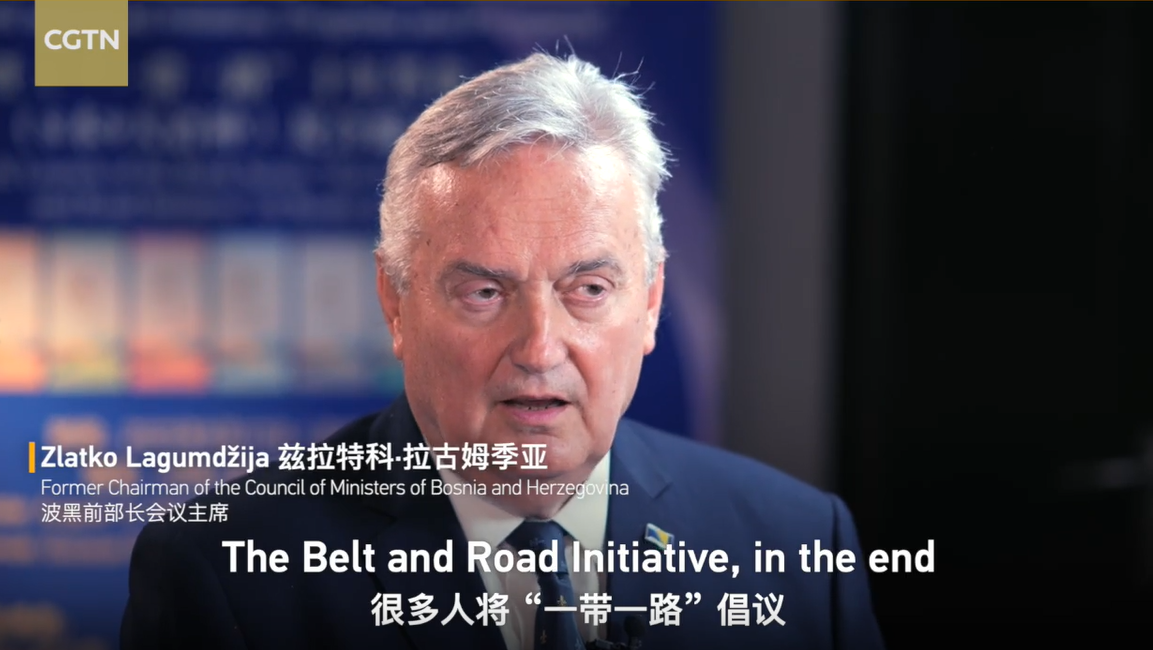VIDEOS
Your Present Location: VIDEOSZlatko Lagumdžija: Beyond roads and bridges: BRI is about people
Source: CGTN Published: 2023-10-15

This year marks the 10th anniversary of the Belt and Road Initiative (BRI). What benefits has the initiative brought to partner countries? What is the logic behind the smear campaign by some American and European media? In this episode of Reality Check, Zlatko Lagumdžija, former chairman of the Council of Ministers of Bosnia and Herzegovina, shares his thoughts on the BRI.
The Belt and Road Initiative (BRI), in the end, a lot of people see it as an infrastructure project, as I can put it, a hardware project. But I don't see it that way. Of course, it is hardware. But it's more about software. After all, it's much more about work-ware and life-ware. It's about putting people together. It's about connecting people together and connecting them with railways or with trade, but basically speaking, putting people together.
And of course, Belt and Road is about leadership. It's about leadership and it's about vision. So, these are the things that we need on a global scale more and more. So, that's the reason why building up on the Belt and Road Initiative. President Xi, in the last few years, even in the United Nations General Assembly, almost two years ago or a year ago, initiated his Global Development Initiative (GDI), which was a big umbrella for China's Five-Year Plan and the Belt and Road as a bigger thing. Then we have the Global Security Initiative (GSI). These are the things that the philosophy and culture of Belt and Road is producing, inducing and mutually strengthening.
I see that, of course, every big project is always seen in controversy by some people, people who maybe don't understand, people who are interested in keeping the status quo. But, the fact that there are roadblocks means that there are old forces that have to be somehow replaced, the old unjust world, and the current unjust world. I'm of a generation who was raised with a project called Moon Shot. An American president back in 1962 said I want to have men on the moon by the end of this decade. And legend says, when the director of NASA wanted to ask him for a bigger budget, he said: "Mr. President, you want him back as well?" Then he got a bigger budget. And at the end of the day, the people landed on the moon.
There are always big projects questioned by people who are skeptical about it. But also, we know that history and civilization were moved forward by the great projects. Of course, there are a lot of little things that have to be done on the way to it. But what is the alternative? It said it's not sustainable, what is not sustainable, that people get closer? What is not sustainable that people communicate more? What is not sustainable that people trade more? What is not sustainable that we create, make, and empower poor people to get more powerful, to get richer, so they can share their wealth in the future together with the people who are already more powerful and wealthy? Or are we going to what is not sustainable that we have islands of poor people, our poor states, low-income states, what do they will do then? The rich ones will surround them with the walls?
So, the people are saying it's not sustainable, the best answer to them is, but your segregated world in which we will be defined by our ethnicity, our nation, our religion, our wealth and be grouped together in small clans, groups, cohorts, call it however you want to, is that sustainable? No. Because we live in a world in which we are significantly more powerful economically than 10 years ago. What China has done since the opening-up is not known in history. What did you do in the technological sense, in technology? What did you do with the growth of the number of your educated people? It's impossible. At the same time, you are stronger, you're more powerful, and you're more powerful to build a better world. But at the same time, you're more powerful to destroy this world and destroy yourself together with all of us. So that's what those people are saying is not sustainable. The point is very simple, the world that you are preaching for, the world of segregated societies, surrounded by little walls of rich and poor, this identity and that identity in the world, which is not the world with a shared future that is not sustainable for anyone.
Key Words: Zlatko Lagumdžija, BRI























































































 京公网安备 11010802037854号
京公网安备 11010802037854号





